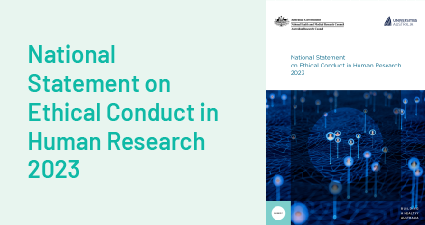Overview
Overview
The conduct of research activities involving human or animal participants is governed by ethics guidelines contained in legislation and policies. The central objectives of ECU’s research ethics arrangements are to nurture ethical conduct and facilitate quality research. This is achieved by resourcing the reflective practice of ECU’s research.
The foundation of reflective practice is that ethical challenges and questions that arise in research rarely produce a single answer that would be correct for every project. The specifics of the discipline, methodology, research question and research topic, the potential participant pool and contextual factors such as the location of a project and the experience of the researcher necessitate a more nuanced approach.
At ECU our primary objectives of research ethics reviews are to provide applicants with constructive and collegiate feedback and in doing so, facilitate the conduct of excellent ethical research.
Our approach to research ethics & integrity
At ECU, our collaborative and reflective approach to research ethics is one which empowers researchers to understand and apply the principles of research ethics to all activities. ECU’s Framework for Responsible Conduct of Research underpins our approach to research integrity.
Applying for research ethics approval
All research projects at ECU are required to be tested within the Proportional Review Checklist to determine what level of research ethics review is required for the work. Even if you are sure your work does not require human or animal ethics review, you should still complete the Proportional Review Checklist (PRC) so your research activity is recorded.
Research Ethics documents and forms
Quick access to key research ethics documents, including:
- ECU Ethics Committee meeting schedules and terms of reference
- Policies and Guidelines
- Internal and External documents, including:
Resources to support research ethics applications
ECU’s constructive approach to research ethics is supported by online and face to face professional learning resources. This section also contains helpful guidelines for developing information letters and consent forms for human participants.
Managing your approved research ethics application
Once your research ethics application is approved, regular monitoring and reporting is required. Amendments or extensions to an application and reporting adverse events can also be made.
Human Research Ethics Committee (HREC)
HREC meeting dates and when your ethics application must be submitted ahead of a meeting.
| Close of Agenda | Meeting Date |
|---|---|
| 20 February 2026 | 6 March 2026 |
| 20 March 2026 | 2 April 2026* |
| 17 April 2026 | 1 May 2026 |
| 22 May 2026 | 5 June 2026 |
| 19 June 2026 | 3 July 2026 |
| 24 July 2026 | 7 August 2026 |
| 21 August 2026 | 4 September 2026 |
| 18 September 2026 | 2 October 2026 |
| 23 October 2026 | 6 November 2026 |
| 20 November 2026 | 4 December 2026 |
Download the 2026 Human Research Ethics Meeting Schedule
Animal Ethics Committee (AEC)
AEC meeting dates and when your ethics application must be submitted ahead of a meeting.
| Close of Agenda | Meeting Date |
|---|---|
| 30 January 2026 | 13 February 2026 |
| 27 February 2026 | 13 March 2026 |
| 27 March 2026 | 10 April 2026 |
| 24 April 2026 | 8 May 2026 |
| 29 May 2026 | 12 June 2026 |
| 26 June 2026 | 10 July 2026 |
| 31 July 2026 | 14 August 2026 |
| 28 August 2026 | 11 September 2026 |
| 25 September 2026 | 9 October 2026 |
| 30 October 2026 | 13 November 2026 |
| 27 November 2026 | 11 December 2026 |
Download the 2026 Animal Ethics Meeting Schedule
